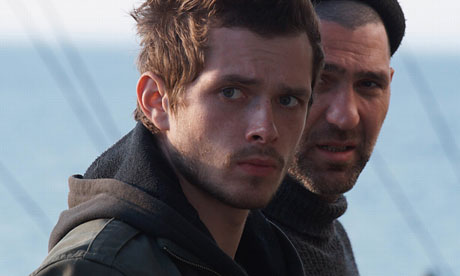How I Ended This Summer – review

How I Ended This Summer: Grigory Dobrygin (left) and Sergei Puskepalis shared the prize for best actor at the 2010 Berlin festival.
A few weeks ago at the Rio we had the existential disturbing thriller Essential Killing, and with How I Ended this Summer, Russian director Aleksei Popogrebsky brings us a similarly stark tale of isolation and man living with and against nature’s elements.
In freezing and testing conditions, Sergei [Sergei Puskepalis], a meteorological researcher and Pavel [Grigory Dobrygin], a young graduate, live and work side-by-side at a research base in a remote Arctic region. The arrangement is akin to a work experience placement for the youngster, but a stern Sergei has to continually remind Pavel (nicknamed Pasha) of the importance of accurate collection and recording of data, as the graduate is often distracted by his music and his own thoughts.
Sergei contacts another research station at regular intervals to convey statistics via radio communications – seemingly weather, temperature and radiation counts – and his day is made up of these reports, data collection, sleep and hunting. It is a lonely and repetitive existence, but Sergei seems to find serenity in this existence and is at one with his austere natural surroundings.
Pasha is there to write an essay entitled “How I Ended this Summer” and from the brief communications we hear with the other weather station, it would suggest a friend has pulled some strings to get him there under the supervision of Sergei. Such a remote habitat could provide an ideal space to write, but in his time away from the research work, Pasha seems to just listen to indie music, play shoot -‘em-up computer games and sleep.
It is understandable that for a handsome and hip graduate, the repetition, loneliness and irregular sleeping patterns are difficult to deal with and staying focused proves a struggle, but when Sergei starts to get irritated, Pasha starts to get intimidated. For a bit of space as much his stated reason, Sergei takes an unauthorised fishing trip in his boat, leaving Pasha the responsibility of holding the fort.
While Sergei is away from the station post, Pasha is given an important personal message for Sergei from the other station, which he is to relay to him on his return, but in the pivotal moment of the story he delays telling Sergei the news. Whether due to fear, cowardliness or a naive decision to find the right time to break the news, the act of hesitation is the trigger that transports the film from quaint aestheticism to gritty, psychological suspense.
The atmosphere of this remote environment is infected by an escalation of lies and psychological issues that turns a sensitive situation into potential fatal game of cat and mouse. Gael Garcia Bernal-lookalike Grigory Dobrygin is fantastic and believable as the student-turned-schizophrenic and his character’s desperation is at times comedic in its absurdity, but there is just enough empathy for his plight to make this over-long film engaging to the end.
How I Ended this Summer is beautifully filmed and artful in its lingering cinematography, but it feels like Popogrebsky couldn’t decide whether to make it a thought-provoking landscape drama, dark thriller or quirky theatre and the result is a concoction of the three, which doesn’t quite justify the 130 minutes running time. However, is it an intriguing story and the two secluded men could be characters from a Samuel Beckett play, as they show what could happen with too much time spent in the company of one’s own consciousness.
How I Ended This Summer (12A)
Directed by Aleksei Popogrebsky
Starring: Grigory Dobrygin Sergei Puskepali
Running time: 130 minutes
How I Ended this Summer is showing at the Rio Cinema until tomorrow, 28 April
